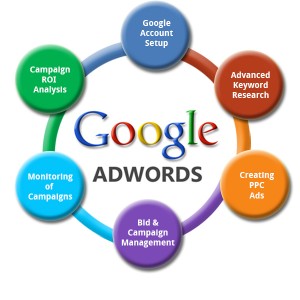 Search advertising is the kind of advertising you see when you do a Google search – it’s the listings you see on the right side of the search results page. Sometimes, they are also at the top of the page, too. Search advertising is also known as pay-per-click (PPC) ads, paid search, and keyword advertising, among other terms.
Search advertising is the kind of advertising you see when you do a Google search – it’s the listings you see on the right side of the search results page. Sometimes, they are also at the top of the page, too. Search advertising is also known as pay-per-click (PPC) ads, paid search, and keyword advertising, among other terms.
As the pay-per-click name suggests, one important aspect of search advertising is that it costs you money only when someone actively clicks on your ad and visits your website. In a typical search ad campaign, your ad will generate a click only a small percentage of the time – typically less than 5%. The rest of the time, the ad runs for free. When a click does happen, you pay some amount of money based on the specific situation. The amount will vary based on the keyword terms involved as well as the level of competition, the positioning of the ad, and the platform the ad is running on, among other factors.
The leading search advertising platform is Google AdWords. AdWords displays keyword-based ads within the Google search engine, Gmail, and other Google products as well as on myriad other websites that have joined their network. Another major search advertising platform is Bing Ads which runs on Microsoft and Yahoo products.
Creating an Effective Search Advertising Campaign
Setting up a search advertising program to promote your organization involves a number of things, including:
- Identifying the keyword search terms you want to target. This involves figuring out what terms people would be likely to use if they were going to be looking for a business like yours.
- Creating ad copy. Search ads must conform to very specific parameters in terms of length and content. Crafting ads that stand out from the crowd is both art and science. The science involves iterative testing of various text options to figure out what performs best. It is often surprising what catches people’s eye.
- Creating customized landing pages. You generally don’t want to point your ads to your home page. Instead, you want to create customized ‘landing pages’ specifically designed for people who are clicking on your ad. This can not only help to reduce your costs by increasing the ‘relevance’ of your site, but it can provide a better experience the people who click through your ad to your website. Google notices if people click right back from an ad to the search results, so it is important to send people to a page that captures their interest immediately.
- Setting budget and configuring settings. In addition to the decision of how much money to spend (by day, by month, etc.), there are numerous configuration options within complex ad platforms such as Google AdWords. These include setting the type of keyword ‘match’ you want, the geographic area you want to target, and/or the schedule you want the ad to run on. Choosing the right configuration options will help save you money and get you inquiries from the types of people most likely to be solid prospects for your business.
Running Search Ads on Your Own Website
 If it makes good business sense, it is also possible to run search ads on your own website. This is done using an advertising platform called Google AdSense. Google AdSense is essentially the flipside of the Google AdWords program – they are two sides of the same technology platform. On one side (AdWords), advertisers specify ads they want to run and on the other side (AdSense), website publishers specify what ads they are willing to publish on their websites. You can participate in both programs at the same time.
If it makes good business sense, it is also possible to run search ads on your own website. This is done using an advertising platform called Google AdSense. Google AdSense is essentially the flipside of the Google AdWords program – they are two sides of the same technology platform. On one side (AdWords), advertisers specify ads they want to run and on the other side (AdSense), website publishers specify what ads they are willing to publish on their websites. You can participate in both programs at the same time.
While you can make money running search ads, they aren’t suitable for every website. For instance, if you have a locally oriented business that competes with other companies in the area, you may well find yourself running ads for your competitors. Typically, this is not ideal. On the other hand, if you are an informational site of some sort (a directory or a guide, for instance), running ads is a very logical thing to consider.
If you decide to publish ads via Google AdSense, Google will automatically decide what ads to run on your site based on relevance. In other words, they apply basically the same type of criteria they use to determine what ads to run next to the results for a search term.
If publishing ads make sense for your site, it is fairly easy to get them up and running.
Our Search Advertising Experience
Webdot has extensive experience creating and managing search advertising campaigns. We have created locally targeted campaigns that spend just a few dollars a day as well as large campaigns that target hundreds of terms and spend thousands of dollars a month. We have also worked the other side helping companies publish search ads on their own websites.
Whatever your needs, we can help you build out and test a search marketing program that meets your business and budgetary goals.
